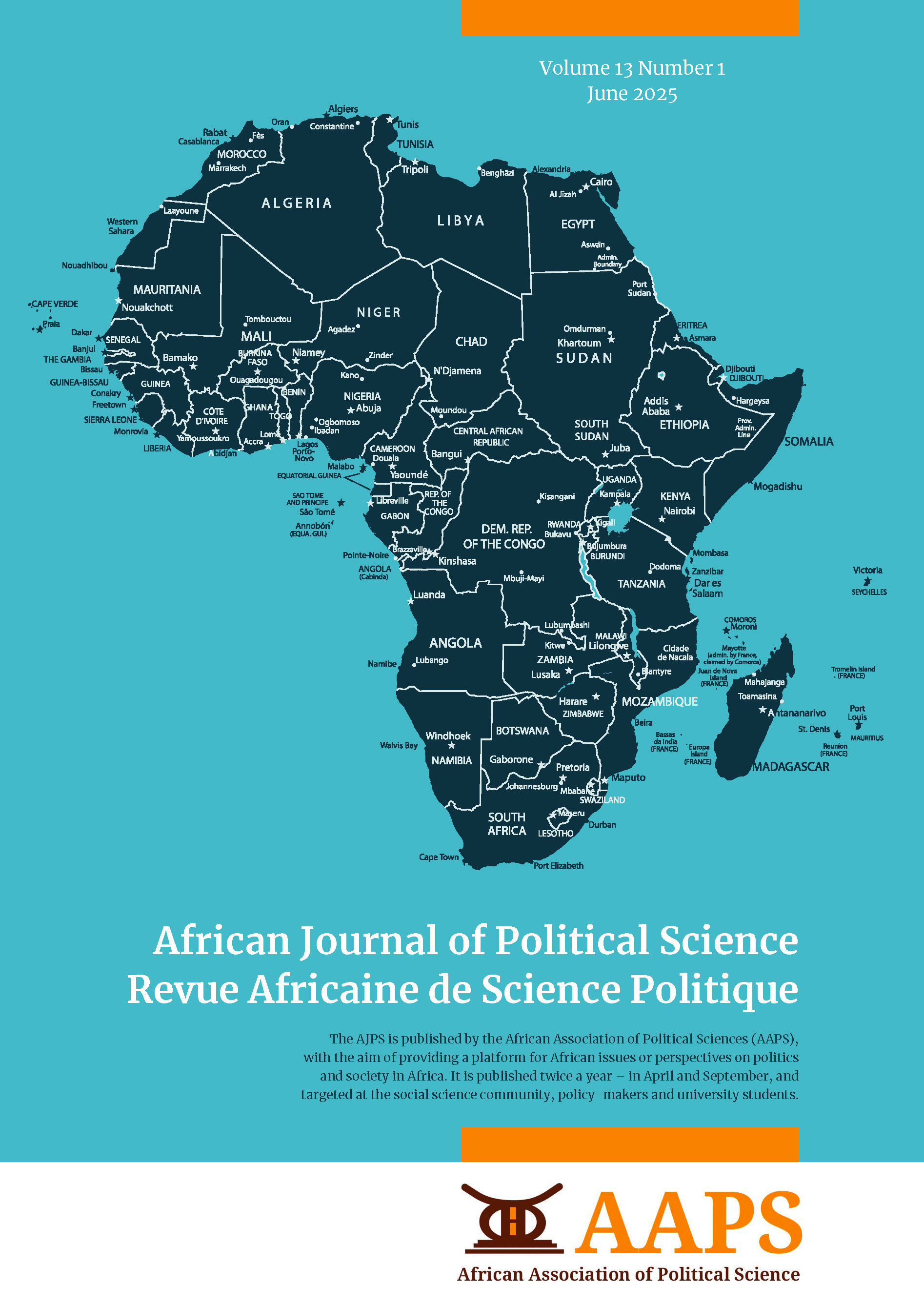Africa Regional Unification In the Eyes of Indigenous Thinkers, Adebayo Adedeji and Raúl Prebisch
##plugins.themes.bootstrap3.article.main##
Keywords
Résumé
Adebayo Adedeji and Prebisch are revered as generational thinkers and exemplars of regional economic integration in Africa and Latin America. Both have addressed unequal wealth distribution and unfavourable conditions that lead to underdevelopment. They sought to promote domestic development concepts rather than accept a global blanket prescription for resolving the underdevelopment problem. In addition, their worldview influenced thousands of young intellectuals and activists on both continents. Their experience and unique views on the role of regional integration in establishing economic space and political differentiation were invaluable. They helped the UN embrace local intellectual thought as a development principle. Their intellectual and personal qualities allowed them to argue for reviving economic principles in both regions’ development policies. Adedeji mocked the Bretton Woods institutions for their determination to tout success stories from SAPs despite all evidence to the contrary. This paper compares their philosophical framework to today’s economic and development concerns.
##plugins.generic.articleMetricsGraph.articlePageHeading##
Références
Adebajo, Adekeye. “Two prophets of regional integration: Prebisch and Adedeji.” 2013. https://doi.org/10.1093/acprof:oso/9780199671656.003.0020
Adedeji, Adebayo. “Adebayo Adedeji (1930–).” Fifty Key Thinkers on Development (2006): 3.
Adedeji, Adebayo. “From the Lagos Plan of Action to the New Partnership for African Development and from the Final Act of Lagos to the Constitutive Act: Wither Africa?.” In Keynote address to the African Forum for Envisioning Africa, Nairobi, Kenya, pp. 26-29. 2002.
Adesina, J. “Africa and the Challenge of Social Policy.” (2002).
Adesina, J. “NEPAD and WTO Agreements: linkages and contradictions.” In Presentation at the Regional Workshop on the Interface between Trade and Regional Partnership Agreements, pp. 29-30. 2002.
Adésínà, Jìmí O. “NEPAD and the challenge of Africa’s development: Towards the political economy of a discourse.” African Journal of International Affairs 4, no. 1-2 (2001).
AGARWAL, ANIL. “Sanmi-Ajiki, T.(2000) Adebayo Adedeji: A Rainbow in the Sky of his Time. A Biography, Lagos: Newswatch Books. World Bank (1981) Accelerated Development in Sub-Saharan Africa: An Agenda for Action, Washington, DC: World Bank.” Fifty Key Thinkers on Development: 9.
Ajibo, Collins, Chidebe Nwankwo, and Eghosa Ekhator. “Regional economic communities as the building blocs of the African Continental Free Trade Area Agreement.” Transnational Dispute Management (TDM) (2021).
Akani, E. C. “From the Lagos Plan of Action (LPA) to the New Partnership for African Development (NEPAD). What Went Wrong.” International Journal of Development Research 7, no. 7 (2017): 13517-13525.
Daniel, Rosaline, and Dawn Nagar. “Region-building and Regional Integration in Africa.” (2014).
Dinka, Tesfaye, and Walter Kennes. “Africa’s regional integration arrangements: history and challenges.” Centre européen de gestion des politiques de développement. Document de réflexion 74 (2007).
Dosman, EJ. “Raúl Prebisch and the XXIst century development challenges.” Santiago de Chile: CEPAL (2012).
Edoun, Emmanuel Innocents. “Analysis of external debt investment in Africa and its implication on development.” Investment management and financial innovations 12,№ 1 (contin. 2) (2015): 346-355.
Evans, Peter. “Development as institutional change: the pitfalls of monocropping and the potentials of deliberation.” Studies in comparative international development 38, no. 4 (2004): 30-52. https://doi.org/10.1007/BF02686327
Frimpong Oppong, Richard. “The African Union, the African Economic Community and Africa’s regional economic communities: untangling a complex web.” African Journal of International and Comparative Law 18, no. 1 (2010): 92-103. https://doi.org/10.3366/E0954889009000528
Jiboku, Peace A. “The challenge of regional economic integration in Africa: Theory and reality.” Africa’s Public Service Delivery & Performance Review 3, no. 4 (2015): 5-28. https://doi.org/10.4102/apsdpr.v3i4.96
Kayizzi-Mugerwa, Steve, John C. Anyanwu, and Pedro Conceição. “Regional integration in Africa: an introduction.” African Development Review 26, no. S1 (2014): 1-6. https://doi.org/10.1111/1467-8268.12102
Kidane, Seife Tadelle. “A Critique of the Current Approach to African Unification in order to explore an Alternative Unification Theory: The case of the Horn of Africa.” PhD diss., University of Pretoria, 2021.
Kidane, Seife Tadelle. “The structural impediments to African Reintegration: a comparative analysis of EAC, ECOWAS and SADC.” PhD diss., University of Pretoria, 2018.
Lehloenya, Palallo Michael, and Maropeng Norman Mpya. “Exploring the citizen inclusiveness and micro-economic empowerment aspects of regional integration in Africa.” Law, Democracy & Development 20 (2016): 91-105. https://doi.org/10.4314/ldd.v20i1.5
Love, Joseph L. “Raul Prebisch and the origins of the doctrine of unequal exchange.” Latin American Research Review 15, no. 3 (1980): 45-72. https://doi.org/10.1017/S0023879100033100
McGregor, Andrew. “Fifty Key Thinkers on Development–Edited by David Simon.” (2007): 248-249. https://doi.org/10.1111/j.1467-9493.2007.00298.x
Mkandawire, Thandika, and Nations Unies. Social policy in a development context. Vol. 25. Geneva: United Nations Research Institute for Social Development, 2001.
Mkandawire, Thandika, and Virginia Rodríguez. Globalization and social development after Copenhagen: Premises, promises and policies. No. 10. Geneva 2000 Occasional Paper, 2000.
Mkandawire, Thandika. “Thinking about developmental states in Africa.” Cambridge journal of economics 25, no. 3 (2001): 289-314. https://doi.org/10.1093/cje/25.3.289
Mulat, Teshome. “Multilateralism and Africa’s regional economic communities.” J. World Trade 32 (1998): 115. https://doi.org/10.54648/TRAD1998034
Nagar, Dawn, and Elizabeth Otitodun. “Adedeji at 80: Moving Africa from Rhetoric to Action.” (2010).
Ocampo, José Antonio. “Raúl Prebisch and the development agenda at the dawn of the twenty-first century.” Cepal Review (2001). https://doi.org/10.18356/80eee999-en
Ocampo, José Antonio. “Rethinking the development agenda.” Cambridge Journal of Economics 26, no. 3 (2002): 393-407. https://doi.org/10.1093/cje/26.3.393
Olukoshi, Adebayo. “African scholars and African studies.” Development in practice 16, no. 6 (2006): 533-544. https://doi.org/10.1080/09614520600958116
Saad-Filho, Alfredo. “Structuralism and Dependency Theory.” The origins of development economics: how schools of economic thought have addressed development (2005): 128.
Sako, Soumana. “Challenges facing Africa’s regional economic communities in capacity building.” (2006).
Seife, T. K. “Being, Belonging and Becoming in Africa: A Postcolonial Rethinking.” Strategic Review for Southern Africa 43, no. 2 (2021). https://doi.org/10.35293/srsa.v43i2.3600
Seife Tadelle. 2022. “The DRC’s Accession to the EAC: A Zero-Sum Game in African Regional Bloc Formation.” The Reporter September 17. https://www.thereporterethiopia.com/26407/
Sprout, Ronald VA. “The ideas of Raúl Prebisch.” Cepal Review (1992). https://doi.org/10.18356/3fc060a1-en
United Nations. Economic Commission for Africa. “African alternative framework to structural adjustment programmes for socio-economic recovery and transformation (AAF-SAP).” (1989).
Vera, Leonardo. “Some Useful Concepts for Development Economics in the Tradition of L atin A merican Structuralism.” American Journal of Economics and Sociology 72, no. 4 (2013): 917-948. https://doi.org/10.1111/ajes.12027


